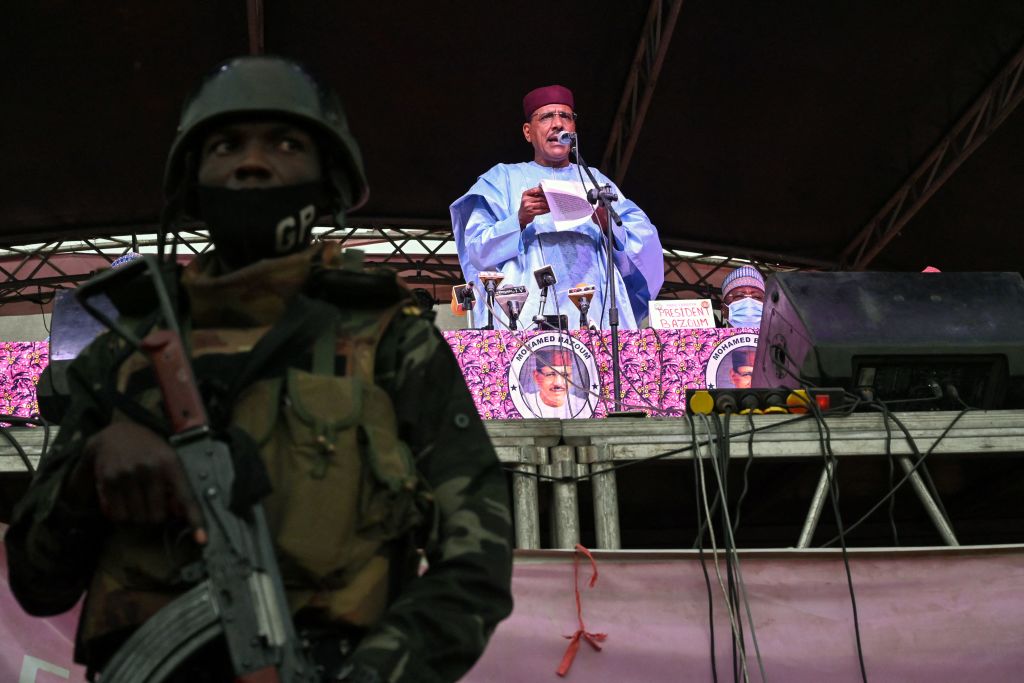ADF STAFF
In little more than two years, Niger has exemplified the power of presidential security forces — and what can happen when that power is unchecked.
In March 2021, Niger’s presidential guard quelled an attempted coup by elements of the military two days before the inauguration of President-elect Mohamed Bazoum.
In July 2023, the presidential guard led a coup that deposed Bazoum.
The mutiny within the president’s innermost circle was led by the same man who protected the presidential residence in 2021 — Gen. Abdourahamane Tchiani, head of the presidential guard since 2011.
On July 26, 2023, Tchiani detained Bazoum in his home, which is located within the presidential guard’s military base in the capital, Niamey. Hours later, Tchiani declared himself head of a transitional government with no mention of returning to civilian control.
Bazoum had been in the process of diminishing the power of his presidential guard, reducing its numbers from 2,000 to about 700 during his term in office. Multiple reports say the president planned to force Tchiani into retirement within days of the coup.
“When you try to change that, there are going to be actors within the military that perceive that as their interests being negatively affected,” researcher Daniel Eizenga told Vox Media.
Eizenga, a research fellow at the Africa Center for Strategic Studies, said the presidential guard had enough influence and autonomy from the regular military to have created a sense of impunity.
“The coup justifications have no foundation to stand on in Niger,” he said, adding that the uprising appears to be due to “the egotistical motivations of this individual.”
Bazoum’s mentor and predecessor as president, Mahamadou Issoufou, had a hand in building up the presidential guard.
During his two terms in office from 2011-2021, Issoufou directed Tchiani to “transform the presidential guard into a powerful machine equipped with sophisticated weapons,” a government official told Agence France-Presse.
Issoufou believed an elite guard would protect him against coup attempts in a country that had four since it gained independence in 1960.
Abdourahmane Idrissa, a Nigerian researcher at the Netherlands-based African Studies Centre Leiden, said Tchiani and the “presidential guard [were] imposed on Mohamed Bazoum against his will.”
“These security forces were the only ones in direct contact with him, so it was very easy for them to take control,” Idrissa told France 24.
In recent months, while Bazoum reduced the size of the presidential guard and began to scrutinize its budget, the relationship between him and Tchiani reportedly deteriorated.
Eager to chart his own course, Bazoum removed Gen. Salifou Mody, Niger’s military chief of staff, in April 2023. Analysts say the decision created a sense of ambivalence and mistrust among many military officers.
Mody played a key role in rallying the military to support the coup, an advisor to Bazoum told The New York Times.
Tchiani appointed Mody vice president of the junta on August 2.
Alex Thurston, who studies African politics at the University of Cincinnati, speculated that Bazoum was attempting to gradually replace the upper echelon of the military.
“Thus Tchiani was not the only one who saw his job under threat,” Thurston wrote in an August 3 post on his Sahel blog.
“He [Tchiani] may be tapping into a strain of grievance against civilian leaders — or against the situation of the past decade or more in general — that makes soldiers willing to try a radical experiment in military rule.”
Maj. Gen. Prince C. Johnson III, chief of staff of the Armed Forces of Liberia since 2018, has a deep understanding of authoritarianism and military coups in West Africa. His father fought in the first Liberian civil war and also led the Liberian military.
One day after Niger’s latest coup, Johnson urged government leaders in the region to limit the power of “presidential guards or elite forces that have direct control over the commander-in-chief.”
“If you look at what is happening in Niger, it is the presidential guards,” he said to reporters on the sidelines of a July 27 committee meeting of the Economic Community of West African States (ECOWAS).
“Look at our history in Liberia. We have seen the issue of these guards being misused.”
Johnson said ECOWAS member states must be mindful of how much control they have given their militaries.
“When you have this political interference into the command and control of the military, like having a presidential guard, the commander-in-chief selecting somebody to head it instead of allowing the chief of defense staff to go through that process … then it becomes a problem.”

